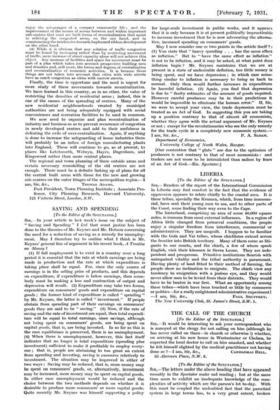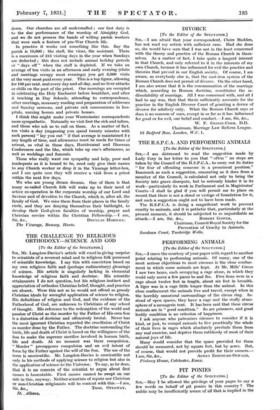[To the Editor of the SPECTATOR.] SIR, — The letters under the
above heading that have appeared recently in the Spectator make sad reading ; but at the same time seem to exhibit an inadequate knowledge of the com- plexities of activity which are the parson's lot to-day. With this must be coupled the undoubted fact that the parochial system in large towns has, to a very great extent, broken
down. Our churches are all understaffed ; our first duty is to the due performance of the worship of Almighty God, and we do not possess the bands of willing parish workers that were such a feature of pre-War Church life.
In practice it works out something like this. Say the parish is 10,000 ; the staff, the vicar, the assistant. There is a maximum of 813 visiting days in the year when Sundays are deducted ; this does not include annual holiday periods or " days off " when the staff is depleted. If we take an average of ten visits in an afternoon and early evening (clubs and meetings occupy most evenings) you get 3,000 visits at the very most paid every year. This is a top figure, allowing for 100-per cent. zeal every day and all day, and no liver attacks or chills on the part of the priest. Our mornings are occupied in celebrating the Holy Eucharist before breakfast, and after it teaching in Day Schools, attending to correspondence, other meetings, necessary reading and preparation of addresses and Sunday sermons, and private sick communions in hos- pitals, nursing homes and private houses. - I think this might make your. Westminster correspondents more sympathetic. Naturally we visit first the sick and infirm, and those who ask us to call on them. As a matter of fact, ten visits a day, (supposing you spend twenty minutes with each person) " lay you out " if that average is maintained fcr any length of time, and allowances must be made for times of retreat, so vital in these days, Ruridecanal and Diocesan Conferences and the like, which take up one's afternoons, as well as weddings and funerals.
Those who really want our sympathy and help, poor and inadequate as it is bound to be, need only give their names to any Church worker or drop it in the Vicarage letter-box, and I am quite sure they will receive a visit from a priest within the next few days.
We who are young dream dreams. One of them is that many so-called Church folk will wake up to their need of active co-operation in the corporate worship of our Lord and Saviour and of devotion to the Church, which is, after all, the family of God. We miss them from their places in the family circle, and they are denying themselves their birthright, to develop their God-given faculties of worship, prayer and Christian service within the Christian Fellowship.—I am,











































 Previous page
Previous page